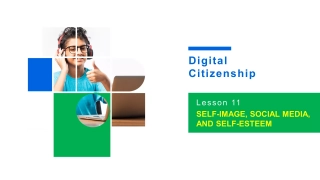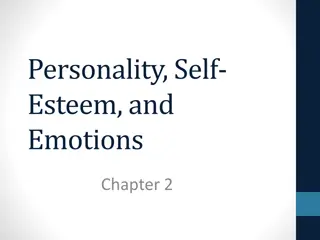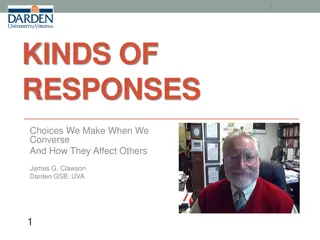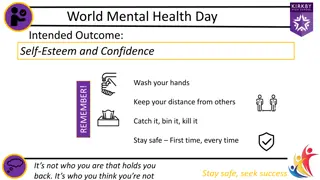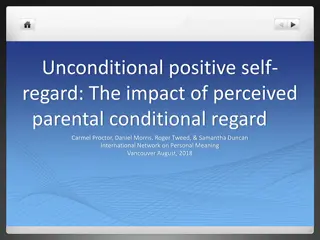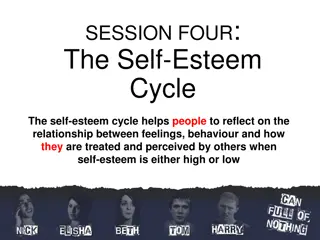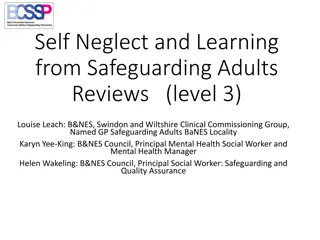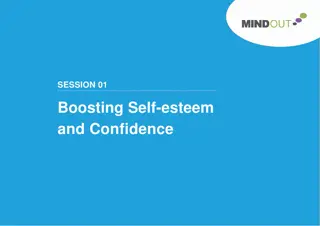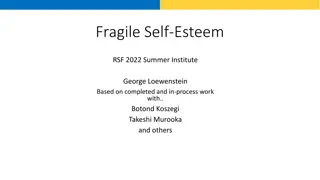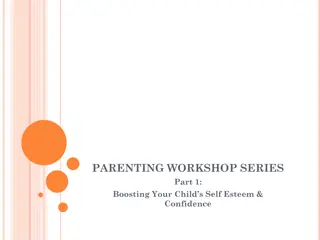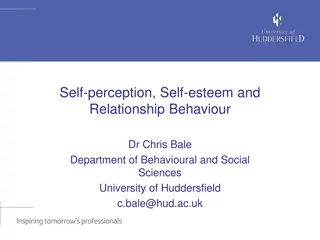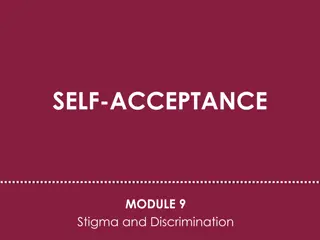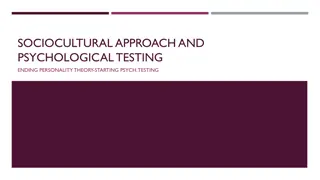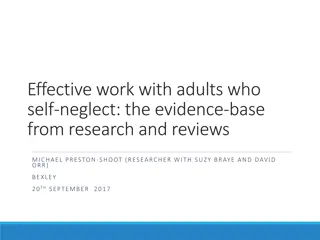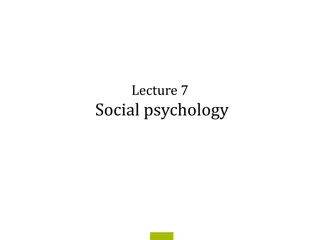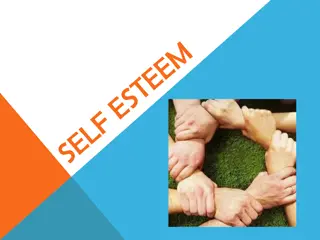Digital Citizenship: Self-Image, Social Media, and Self-Esteem
Explore the impact of social media on self-image and self-esteem. Learn about the influence of filters and media on body perception. Reflect on self-assessment and take-home activities to improve self-confidence.
3 views • 11 slides
Understanding the Choice Moment: Enhancing Self-Awareness and Personal Growth
Explore the concept of the Choice Moment in Grade 10 Lesson 6, focusing on stimuli, senses, emotional responses, and strategies for self-reflection. Learn how engaging in this moment can lead to better decision-making, improved self-esteem, and overall well-being.
0 views • 6 slides
Understanding the Power of Praise in Child Development
Praise plays a crucial role in promoting children’s self-esteem and overall development. By offering genuine praise for being and doing, parents can nurture a positive sense of self-worth in their children. Research shows that praised children tend to excel academically, show resilience, and lead
0 views • 26 slides
Understanding Self-Worth in Children: Building a Strong Foundation
Explore the importance of self-concept, self-esteem, and self-worth in children's development. Learn how parents can positively impact a child's self-perception and self-value through nurturing experiences. Discover the key sources influencing children's self-worth and the critical role of early lif
0 views • 30 slides
Understanding the Impact of Social Media on Self-Image and Self-Esteem
Explore the story of Tara, a 13-year-old girl whose experience with social media shapes her self-image and self-esteem. Delve into how social media can influence our perceptions of ourselves and others, affecting mental well-being and relationships. Understand the role of digital citizenship in navi
10 views • 11 slides
EMPLOYABILITY SKILLS
Self-management skills are essential for regulating emotions, thoughts, and behavior. Developing self-control and setting goals lead to positive outcomes like improved behavior, motivation, and self-esteem. Recognizing strengths and weaknesses is key to personal growth and achieving success.
4 views • 9 slides
Understanding Personality, Self-Esteem, and Emotions in Mental Health
Exploring the dynamics of personality traits such as extroversion, agreeableness, conscientiousness, emotional stability, and openness to experiences, this content delves into the key aspects of personality, self-esteem, and emotions. It discusses the differences between introverts and extroverts, o
0 views • 12 slides
Understanding Self-Esteem: Meaning, Importance, and Types
Self-esteem is how we perceive our worth and value. High self-esteem leads to confidence and positivity, while low self-esteem can result in self-doubt and negative emotions. Self-esteem impacts mental health, behavior, decisions, relationships, and overall success in life. Recognizing and nurturing
2 views • 15 slides
Understanding Self-Esteem and Ways to Improve It
Self-esteem is our perception of ourselves, impacting how we navigate life. Healthy self-esteem fosters positivity, while low self-esteem can be detrimental. Various factors, like childhood experiences, contribute to low self-esteem, but steps can be taken to improve it. Building positive relationsh
0 views • 14 slides
Understanding Responses in Conversations
Explore the impact of different types of responses in conversations and habitual patterns of speech. Discover how our choices in conversations, even those with ourselves, can shape our self-concept and self-esteem. Learn about the components of the self-concept and how they influence our interaction
0 views • 36 slides
Understanding the Self: Psychology's Focus and Implications
The field of psychology has long been intrigued by the concept of self, exploring its importance to well-being, self-esteem, and brain localization. Research reveals how excessive optimism, self-bias, and blindness to incompetence can impact self-esteem. Contrasting individualist and collectivist cu
1 views • 41 slides
Understanding Self-Esteem, Confidence, and Mental Health
Self-esteem and confidence are crucial for mental well-being. Self-esteem affects how we value ourselves, while confidence is about believing in our abilities. Negative and positive experiences impact these aspects differently. It's important to recognize and address factors that influence our self-
0 views • 9 slides
Academic Senate Resolutions and Low-Cost Thresholds in Higher Education
The Academic Senate addresses the adoption of open educational resources (OER) and low-cost materials to support academic freedom and compliance with legislative requirements. The resolution discusses the definition of low-cost resources and the variability among California Community Colleges in set
2 views • 9 slides
Developing a Self-Care Action Plan for Overall Well-Being
Self-care involves deliberate activities to nurture mental, emotional, physical, and spiritual health, yet it is often neglected. This guide explores the essence of self-care, emphasizes the importance of building a personalized self-care action plan, and provides insights into taking care of your b
0 views • 19 slides
Impact of Parental Conditional Regard on Self-Regard Development
The impact of parental conditional regard (PCR) on self-regard development is significant, affecting authenticity and the ability to form a true self. PCR involves parents showing affection and appreciation based on the child's adherence to specific expectations, leading to negative psychological ou
0 views • 13 slides
Enhancing Self-Confidence for Professional Success
Understanding the importance of self-confidence in the workplace is crucial for personal growth and career advancement. Self-confident individuals trust their abilities, maintain a sense of control over their lives, and have realistic expectations. This summary delves into the characteristics of sel
0 views • 13 slides
Understanding the Self-Esteem Cycle: High vs Low Self-Esteem
The self-esteem cycle explores the interplay between one's feelings, behavior, and how they are treated based on their self-esteem level. High self-esteem is associated with positive feelings, supportive behavior, and positive interactions, while low self-esteem manifests in negative emotions, withd
9 views • 4 slides
Understanding Self-Neglect and Safeguarding in Adults
Self-neglect in adults involves a lack of self-care, neglect of personal hygiene, health, and domestic environment, as well as refusal of services. It can stem from physical or mental health issues, past trauma, hoarding as a coping mechanism,and low self-esteem. Learning about policies, Mental Capa
7 views • 39 slides
Girl's Self-Esteem Tier 2 Intervention at Williamstown Elementary
The intervention at Williamstown Elementary aimed to enhance students' self-esteem through tier 2 small group counseling focusing on social skills. The goal was for students to gain self-awareness, coping mechanisms, problem-solving skills, and a sense of connection with peers. Three groups of girls
0 views • 26 slides
Boosting Self-esteem and Confidence Session for Students
This session aims to help students identify and increase their belief in personal strengths, boosting self-esteem and confidence. Students are encouraged to practice noticing their strengths and creating a list to remind themselves daily. The session focuses on building skills and self-esteem throug
0 views • 6 slides
Exploring Clinical IRAP Research on Self-Esteem, Depression, and More
This collection of research insights delves into Clinical IRAP studies focusing on topics such as self-esteem, depression, spider fear, disgust, OCD, stigma, and more. Findings highlight correlations between D-IRAP scores and self-esteem measures, as well as differences in implicit positive emotion
0 views • 45 slides
Fragile Self-Esteem: Exploring Connections Between Psychology and Economics
Fragile self-esteem is a common but complex phenomenon that impacts individuals' emotions and behaviors. This paper delves into the interplay between psychology and economics to understand the implications of high-but-fragile self-esteem, especially in terms of insecurity and narcissistic traits. Dr
0 views • 27 slides
Enhancing Self-Regulation for Formative Assessment through Social and Emotional Learning
Explore the significance of self-regulation in formative assessment, understand key concepts like self-control, emotional competence, and perseverance. Discover actionable strategies to implement self-regulation interventions with students and train other adults effectively. Future orientation and s
0 views • 25 slides
Understanding Mindful Self-Judgment and Its Role in Mental Health
Mindful self-judgment is a complex concept that involves balancing self-awareness and self-compassion. While nonjudgment is a key aspect of mindfulness practices, there is a debate on whether mindful self-judgment can be appropriate and functional in certain circumstances. Researchers like June Pric
2 views • 46 slides
Understanding Self-Esteem: Highs and Lows
Self-esteem is the judgment we hold about ourselves, shaped by experiences and relationships. High self-esteem individuals embrace new encounters with confidence and positivity, while low self-esteem individuals struggle with self-doubt and criticism. Recognizing signs of low self-esteem is crucial
0 views • 11 slides
Understanding Motivation in Communication & Digital Media
Explore the concept of motivation, its characteristics, factors influencing it, and tools to motivate oneself and others. Dive into the importance of attributes like gratitude, optimism, and self-esteem in being positively motivated. Learn about goal setting, enhancing traits like positiveness, grat
0 views • 19 slides
Understanding God's Care and Holiness Through Scripture
Delve into the verses of 2 Corinthians, Acts, and Psalms, reflecting on themes of cleansing, fear of the Lord, and the awe-inspiring nature of God's creation and care. Explore the concepts of holiness, self-esteem, and God-esteem through powerful imagery and messages from the scriptures.
0 views • 29 slides
Understanding and Nurturing Your Child's Self-Esteem
Self-esteem plays a vital role in a child's development, influencing their beliefs, behaviors, and emotional well-being. Recognizing signs of healthy and unhealthy self-esteem is crucial for parents to support their child's growth. Boosting a child's self-esteem involves praising effort, being a pos
0 views • 11 slides
Boosting Your Child's Self-Esteem & Confidence in Parenting Workshop Series
Understanding self-esteem in children is crucial for their emotional development. Healthy self-esteem leads to positive behaviors, while low self-esteem can result in negative self-perceptions. Recognizing signs of healthy and unhealthy self-esteem allows parents to support and nurture their child's
0 views • 11 slides
Women's Self-Esteem and Relationship Behavior Study: Insights and Implications
This study explores the relationship between women's self-esteem, relational behavior, and perceptions of relational desirability. Findings indicate that self-esteem does not significantly predict relational behavior, with women feeling less desirable than their partners reported investing more in r
0 views • 9 slides
Understanding Self-Perception, Self-Esteem, and Relationship Behavior
The discussion explores the impact of low self-esteem on various psychological issues, societal views on self-worth, self-perception biases, and the consequences of self-esteem in different aspects of life, backed by research and theories such as the Better-Than-Average Effect and Sociometer Theory.
0 views • 19 slides
Understanding Self-Acceptance and Overcoming Stigma
Self-esteem and self-acceptance are distinct concepts, with self-acceptance focusing on embracing all facets of oneself unconditionally. Developing self-acceptance involves stages like aversion, curiosity, tolerance, and allowing. Overcoming avoidance and resistance can lead to self-compassion and g
0 views • 10 slides
Exploring Authenticity: Embracing Your True Self
Delve into the concept of authenticity and what it means to be your true self in a world filled with external pressures. From insights by psychologists on self-awareness and ethical action to philosophical perspectives on individuality and existentialism, discover how being authentic relates to pers
0 views • 11 slides
Sociocultural Factors Influencing Self-Concept and Identity Formation
Explore the impact of sociocultural factors on self-esteem, economic background, gender, and race in shaping one's sense of self. Delve into the concepts of Individualism and Collectivism, analyzing how different parts of the world prioritize these values. Reflect on the importance of teaching child
0 views • 38 slides
Understanding Self-Neglect in Adults: Challenges and Research Insights
This content delves into the complex issue of self-neglect in adults, covering its definition, key challenges, and the research evidence available. It explores the various aspects of self-neglect, including neglect of self-care, domestic environment, and refusal of services. The challenges associate
0 views • 39 slides
Understanding the Impact of Maltreatment on Social Development
Maltreatment, including coercion and abuse of power in family environments, can lead to negative effects on children's social development. It results in lower levels of prosocial behavior, verbal communication, and undervaluing of children. Maltreated children may suffer from low self-esteem, negati
0 views • 15 slides
Understanding the Self in Social Psychology
Delve into the concept of the individual and the self in social psychology, exploring how identities have evolved historically and the distinction between collective and individual selves. Learn about self-awareness, Wundt's differentiation of I and me, and Higgins' self-discrepancy theory, shedding
0 views • 84 slides
Understanding Addictions and Self-Esteem
Exploring various types of addictions such as drug addiction, exercise addiction, gambling addiction, and nicotine addiction. Discussing factors like depression, negative self-esteem, genetic vulnerability, and coping skills. Highlighting the importance of self-esteem, self-control, and social-emoti
0 views • 35 slides
Boosting Self-Esteem: Benefits and Tips for Improvement
Understanding self-esteem, its benefits, and risks of low self-esteem are essential for personal growth. Developing high self-esteem can lead to increased self-respect, goal achievement, and willingness to try new things. On the other hand, low self-esteem can make individuals vulnerable to peer pre
0 views • 10 slides
Understanding Personality and Self-Esteem: Exploring Traits and Mental Health
Exploring personality traits, self-esteem, and mental health through definitions, group activities, and descriptions of extroverts, introverts, optimists, pessimists, and realists. The content covers creating lists of personality traits, identifying assertive behaviors, and outlining objectives rela
0 views • 68 slides
